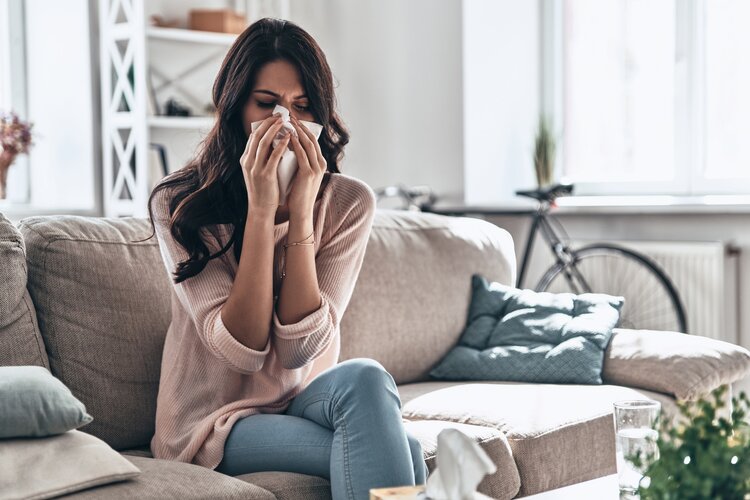If you’ve got a tickle in your throat and are feeling tired during the pandemic, you’ll be worried you’re coming down with Covid-19 symptoms. While you should be extremely cautious right now, bear in mind that it’s the start of the hay fever season, and it could signs of seasonal pollen allergy.
Even if you’ve never had hay fever before (although it usually starts in childhood) some people can start to show symptoms for the first time much later in life. But you need to be absolutely sure about what’s causing your symptoms, and if there’s even a chance it could be coronavirus, self-isolate. The good news is that if it is hay fever, staying inside will help reduce your symptoms anyway.
Thanks to the sunny weather in the UK and Ireland, the Met Office says there are currently increased levels of tree pollen, which can cause hay fever from late March to mid-May. Grass pollen can also cause allergies from mid-May until July, and weed pollen from the end of June to September.
So much amazing work being done by medical students, post-grad students and uni staff to support efforts against COVID incl testing, medical care, research disease n manufacturing supplies. Proud of our unis
— Prof Sheena Cruickshank (@sheencr) April 7, 2020
Professor Sheena Cruikshank, an expert on infection and allergy at the University of Manchester, says: “Hay fever is a seasonal condition triggered by inappropriate immune responses to pollens, and the symptoms differ from Covid-19 symptoms in several important ways. They are not associated with temperature, flu-type aches and an unproductive cough.”
So how can you tell if your symptoms are caused by hay fever or coronavirus? Here are some of the similarities and crucial differences:
1. Tiredness
Both conditions may cause tiredness, but Dr Martin Dace, clinical director of The Smart Clinics in London, points out: “While people can feel tired with hay fever, the tiredness is usually brought on by the tablets they’re taking for it.”
2. Shortness of breath
Dace says around 20% of Covid-19 patients have shortness of breath or a heavy chest, while Cruikshank points out that some people with hay fever may have some asthma-associated symptoms such as tightness of chest and wheezing.

(iStock/PA)
3. Throat problems
While the NHS say hay fever can make your throat itchy, coronavirus can sometimes cause a sore throat, says Dace.
4. Cough
While a continuous, dry cough is a common symptom of coronavirus, a hay fever cough is usually less severe. “If cough occurs it’s because in some people hay fever triggers an asthma-like response which can result in a feeling of tight chest,” says Dace. “The tight chest in hay fever is relieved by a blue asthma inhaler but that is unlikely to help in Covid-19.”
5. Sneezing or runny nose
Dace says usual hay fever symptoms are runny nose, sneezing and itchy watery eyes, but while about a third of Covid-19 patients experience loss of smell and taste, very few people have symptoms of a runny nose or sneezing – based on the World Health Organisation observations of 70,000 cases in China.
Mum says not everyone who sneezes has #COVID19 they might have #hayfever Of course they MUST still sneeze correctly into elbow or tissue.
— Alfie & Daisy ???????? #staysafe (@ByrneCocker) April 6, 2020
6. Itchy eyes
“The Covid-19 infection affects the upper and lower airways, while hay fever typically affects the eyes and nose which are most likely in contact with the pollen spores,” says Cruikshank. So while itchy eyes are common with hay fever, they’re not usually a Covid-19 symptom.
7. Fever
A fever is one of the most common signs of coronavirus, while, despite its name, hay fever doesn’t cause fever says Dace.
8. Aches and pains
While Dace says about 15% of Covid-19 patients have aches and pains, they’re not one of the symptoms of hay fever.
Why did I think Coronavirus was going to cancel out hay fever this year ????!!????
— ???? تنها???? (@txnha) April 7, 2020
9. Feeling unwell
Coronavirus can sometimes make people feel very ill, but that’s not the case with hay fever, and Dace says: “People feel horrible with coronavirus, but they won’t with hay fever.”
10. Duration
The duration of the conditions is markedly different – while hay fever symptoms can last for a month or so dependent on exposure to the allergens and which pollens people are allergic to, Cruikshank says patients with Covid-19 usually – but not always – recover within seven to 14 days.
Dace adds that pharmacists and GPs can give advice about hay fever, and anyone worried about Covid-19 can visit NHS 111 online as an alternative to ringing 111.
